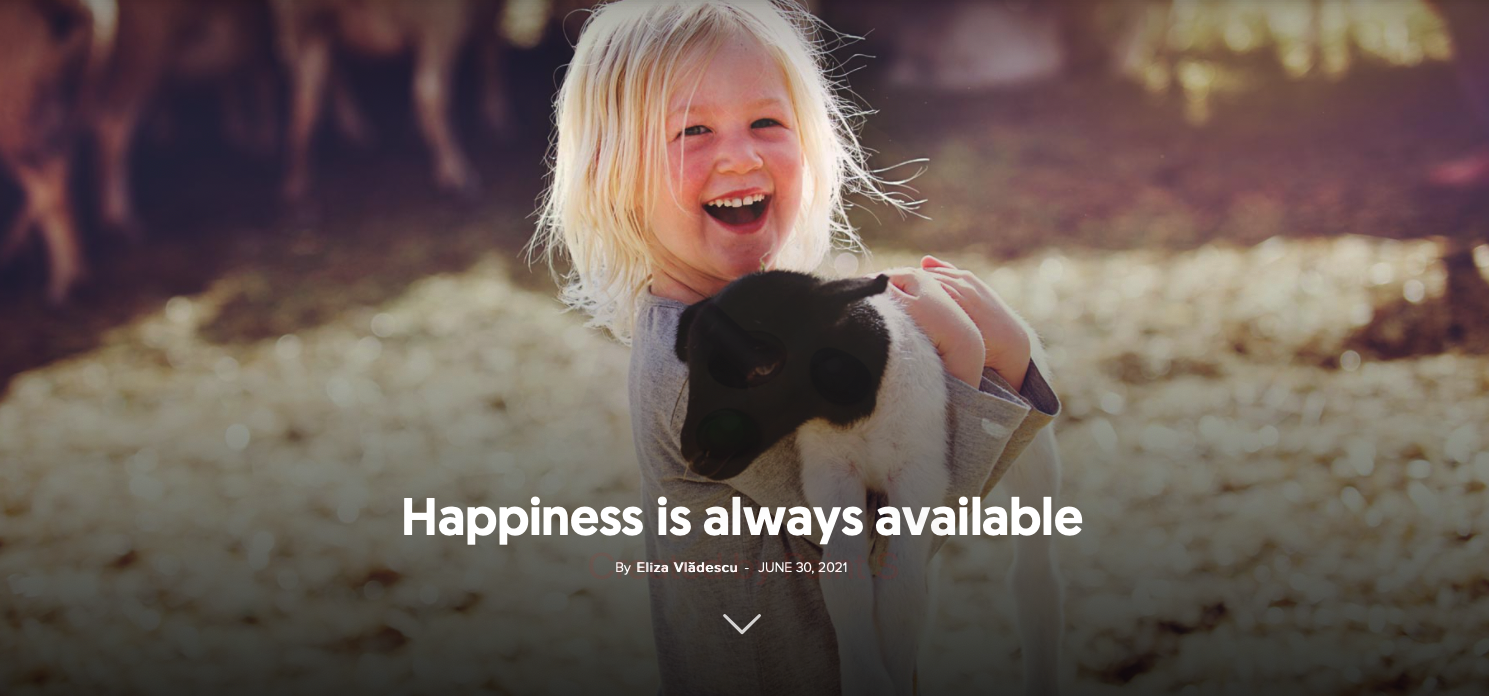“Many people feel out of touch with their feelings. Counselor offices and publishing houses have proliferated thanks to the need to help people to improve their communication skills, to restore their self-confidence and to help them relate to other people.” – Sir Ken Robinson, Out of Our Minds: Learning to be Creative
I once witnessed a scene that showed me how right the theorists in the field of behavioural sciences are with regards to a new type of intelligence, emotional intelligence (EI)—and how it is operationalized, beyond the theory of classic cognitive intelligence, by testing and teaching EI at any age.
I was on the trolleybus when a little girl and her grandfather got on. They were discussing the imminent prospect of her enrollment in the preparatory school year. I witnessed the following dialogue:
“Do I really have to go to school this fall?”
“Yes, you do, there’s no way around it! You see, it’s serious business over there, no more playing around all day!” he replied seriously, looking out the window.
The little girl was scared by the prospect of something so serious and mysterious that would suddenly force her to stop playing. After a moment of frantically searching for a way out, she said:
“But I still can’t speak well… look, I can’t say “L” (she meant “R”).
“Say ‘war’!”
“Wall. See? I can’t say that.”
“Oh, come on. You are fooling around. Sure you can!”
“I really can’t…”
I felt the need to step in because the lack of empathy of that grandfather towards his own granddaughter, whom I’m sure he loved, seemed incredible to me.
“Try saying ‘really’ again, as you said earlier,” I said. Having her little trick revealed, the little girl seemed even more scared, especially since the grandfather nodded approvingly, as if I were his ally. I smiled at the little girl. I told her that I am a teacher, and that I want her to know that at school children feel good when they learn new, pleasant things, suitable for their age and that they only have to do what they can do, nothing hard. She felt so liberated that she gratefully touched my hand and gave me a shy smile.
Zero empathy
Surely, you have come across such scenes in which the protagonist showed a lack of understanding of the feelings and emotions of others, a disappointing affective response to the expectations of those around him or her. Mass media offers, unfortunately, enough current examples.
A state official accused of manslaughtering a policeman in the motorcade, uses every public statement to address his own dignity, his own troubles with the investigation, never ceasing to find excuses for himself and wallow in self-pity. In an important city of Romania, a group of incompetent policemen are heroically fighting a frightened bear cub, and one of them proposes the grotesque “solution” of killing it by running it over with the car. In the aftermath of the tragic fire at Colectiv Club, I was appalled by the response a priest gave to the reproach that the church does not empathise with the suffering of the victims: “Who are you to teach us what the role of the church is?” The public apologies he offered later still sounded like self-sufficiency, lack of empathy, and accusations directed at others, by expressing the regret that he had been misunderstood.
This is how such manifestations are seen through the eyes of a specialist in emotional intelligence. The French psychobiologist, trainer, and writer Jacques Salomé first quotes a patient: “This child is unbearable. Every time I start talking to my wife, he misbehaves, so I have to punish him.” Then Salomé translates for us, as if interpreting an x-ray of the behaviour: “This child does what is needed so that the anger will fall on him, and his parents stop arguing. He knows how previous discussions ended. He sacrifices himself to maintain harmony between them.”[1]
Such cases and behaviours, with their negative consequences in interpersonal relationships, are relevant in helping us understand how much we need to develop our emotional intelligence.
Moreover, as an aggravation of our community situation, specialists find that the rapid evolution in today’s technology and the prolonged presence in the virtual space are affecting the ability of children and youth to create healthy connections with their peers. Also, past predictions regarding the emergence of an economic crisis also predicted an increase in the incidence of anxiety, depression, and failure to adapt to socio-professional life.[2]
The origin of “emotional intelligence”
At the start of the last century, the French psychologist Alfred Binet created the intelligence test as a response to the many parents worried about their children’s intellectual performance at school and their professional future. It was considered one of the great discoveries of psychology, one which quantified cognitive and emotional skills and offered the famous intelligence quotient, IQ. Since then, the IQ has proven useful in many contexts: career guidance, HR selection, even the recruitment of American soldiers in World War I.[3]
In the 1980s, the Jewish psychologist Reuven Bar-On tried to elucidate the paradoxical situation in which very intelligent people fail in life, and others less intellectually gifted succeed. Thus, he articulated the concept of the emotional quotient, which evaluates a large range of skills and qualities of individuals.[4]
Being also concerned with the recipe for success in the relationships that individuals establish with each other, in various contexts of life, American psychologist Daniel Goleman coined the term “emotional intelligence” (EI). It refers to an extension of the individual’s intelligence, beyond reason, in the ability to develop their personality through the best possible management of their emotions. The concept was widely adopted. Thus, the author noted: “For me, the greatest reward came from the warmth with which the concept was adopted by those in charge of education…. Tens of thousands of schools around the world offer children social and emotional education programs.”[5]
Furthermore, in 2002, UNESCO took the initiative to implement social and emotional education in the relevant ministries of 140 countries. Character education, violence prevention, aggression control, school discipline and drug use prevention programs were targeted. They aimed not only to improve the climate in schools and dormitories, but also to increase school performance.
Concrete results and benefits
Goleman states, “Now we can prove this scientifically: If we help children improve their self-awareness and self-confidence, control their distressing emotions and impulses, and develop empathy, their reward will not only be an improved behaviour, but also a measurable academic performance. This is the big news brought to us by a recently concluded meta-analysis of 668 studies evaluating social and emotional education programs for children from preschool age to high school graduates.”[6]
Here is an illustration of this type of education, on the three stages of pre-university education, in the curriculum of the state of Illinois. In primary school, pupils learn to correctly identify their different emotions and feelings, to analyse the effects of these emotions on behaviour, and to identify someone else’s emotions and feelings by nonverbal cues. In secondary school, pupils analyse the factors that generate stress and the factors that motivate them to perform. In high school, students learn to listen and hold discussions and adversarial debates, seeking to smooth out conflicts, rather than escalate them, and to negotiate solutions in which both opposing sides win.[7]
Goleman promotes the idea of expanding this type of education to disadvantaged categories, such as poor families and prisons (especially those for juvenile delinquents), and envisions a future in which it will be a standard practice at every level of education. “…I believe that then our families, schools, jobs, and the communities in which we live will all be more humane and more stimulating.”[8]
Specialists[9] emphasise several benefits of educating the general public in the spirit of developing the individual potential of emotional intelligence. First, such an education creates balance by emphasising the idea that classic “smartness” is not the exclusive driver of fulfilment in life—for instance, the ability to solve math and physics problems—and that, without empathic abilities, stress resilience, relationships based on mutual trust, mutual respect, and collaboration, just being “smart” doesn’t help you get very far.
Then, thanks to the work of various specialists, emotional intelligence can be quantified and measured, with obvious advantages in several fields (from school and professional guidance to human resources policies, from couple counselling to management and marketing strategies). Interestingly, measurements have shown that emotional intelligence overcomes prejudice related to the existence of a gendered intelligence.
The differences consisted in the fact that women had higher scores for categories such as empathy and social responsibility, while men scored better for stress resistance. Another good news is that emotional intelligence transcends racial differences. Average total scores varied by less than 5% among Caucasians, African Americans, and Asian Americans. Finally, it must be said, the intelligence quotient is not fixed over time. Instead, it can be improved regardless of age, gender, race or ethnicity, helping anyone who wants to be a better worker, colleague, parent, life partner, son/daughter, neighbour, etc.
Regarding some behavioural trends often found in children and young people today, Sir Ken Robinson, renowned education expert, has a bitter reflection: they are more prone than previous generations to be “more lonely and depressed, more angry and unruly, more nervous and prone to worry, more impulsive and aggressive.”[10] That is why, especially for them, working on improving the EQ would prove useful.
This is a great need. This would enable today’s young people and children to become good, responsible, empathetic parents and grandparents, rather than worsening problems and exporting them to the extended family, condemning those around them and themselves to much unhappiness.
If our young people cannot come up with saving solutions from within, then it is the duty of parents, trainers, teachers, psychologists, priests, and pastors to intervene at the right time, to revive their emotional intelligence so that, in the end, these young people rediscover their soul and the chance for a happy life. As Antoine de Saint-Exupéry said: it is only with the heart that one can see rightly…
Corina Matei is a PhD associate professor at the Faculty of Communication Sciences and International Relations, part of the “Titu Maiorescu” University, Bucharest.




















